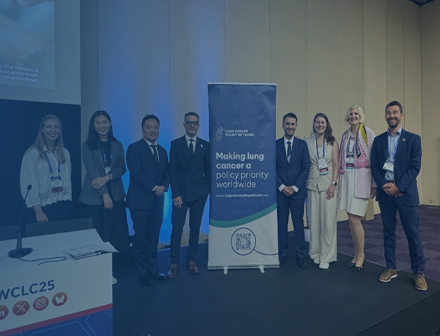We spoke to Jessica Moffatt, PhD, Vice President of Programs & Health System Partnerships at the Lung Health Foundation in Canada
Tell us about the Lung Health Foundation
We are committed to improving the lung health of Canadians through prevention, early detection, treatment and ongoing support for individuals affected by lung disease, including asthma, COPD and lung cancer. We focus on public education, provider training, policy advocacy and systems change, with a strong emphasis on nicotine cessation, advancing lung cancer screening in Canada, and improving care for chronic respiratory conditions.
We believe that lung cancer has long been under-prioritised despite being the leading cause of cancer death. Our goal is to address this gap.
What does an average work day look like for you?
A large part of my role is dedicated to supporting and convening Canada’s broader respiratory health community. This includes leading national collaborations and shared learning opportunities through initiatives such as Better Breathing Week, Canada’s premier lung health conference.
I also provide strategic oversight for our programmes focused on lung cancer, COPD and asthma, working to improve care, enhance access and drive measurable improvements in health outcomes.
On the advocacy front, I work closely with government and health system stakeholders to influence policy and mobilise change that supports lung health. This includes championing the expansion of organised lung cancer screening, advocating for equitable access to early detection and high-quality treatment, and calling for stronger investments in prevention.
What is working well in your country, and what could be improved?
Canada has made important strides in developing organised lung cancer screening programmes, particularly with the implementation of low-dose CT screening initiatives in Ontario and a few other provinces. These efforts represent a critical step forward in detecting lung cancer at earlier, more treatable stages and having the potential to significantly improve outcomes. However, access to screening remains uneven, with many jurisdictions still in the planning or pilot stages. This leaves large segments of the population without timely access to early detection services.
In addition to these geographic disparities, stigma surrounding lung cancer – often linked to smoking – continues to act as a barrier. This stigma can affect public perception, policy prioritisation, and even the willingness of individuals to seek care or advocate for themselves. Addressing this stigma is essential to fostering equitable access and compassionate care.
There is also an urgent need to better integrate prevention, screening, diagnosis and treatment pathways to create a more seamless and person-centred system.
What motivated the foundation to join the Network?
We joined the Network to collaborate with global leaders who are equally committed to shifting the narrative and transforming the policy landscape. We can share best practices, learn from innovative approaches and contribute to a collective voice that can influence systems-level change.
Our participation also allows us to highlight the Canadian experience while learning from the successes and challenges of other countries. This exchange strengthens our ability to design impactful, equitable and sustainable programmes. Most importantly, it helps elevate lung cancer as a public health priority and ensures it receives the attention and investment it deserves. These goals are deeply aligned with our mission to improve lung health and outcomes for all.
What would you like to see from the Network as it develops?
We hope the Network will foster dialogue, support the development of evidence-informed tools and strategies, and create opportunities to align efforts globally.
What changes would you like to see in lung cancer care on a global level?
We envision a future where lung cancer receives the same level of recognition, funding and urgency as other major cancers. This includes equitable access to screening programmes, timely and effective treatment options, and comprehensive supports that address the social determinants of health. Person-centred, stigma-free care should be standard – not the exception – for everyone affected by lung cancer.
What do you think is the most exciting recent research finding?
Low-dose CT screening, and its ability to catch lung cancer at earlier, more treatable stages, is a game-changer. Combined with emerging biomarker research and targeted therapies, we are beginning to see real improvements in survival, shifting lung cancer from a fatal diagnosis to a manageable disease in many cases.
The Lung Cancer Policy Network brings together a unique mix of experts in lung cancer from around the world, united in their passion to eliminate lung cancer as a cause of death.
We regularly share profiles of our members so that you can find out more about what led them to work in lung cancer and what changes they would like to see in lung cancer prevention and care on a global level.
Recent news
Blog

Insights from WCLC 2025
At the World Conference on Lung Cancer in Barcelona, the Network hosted a very well-attended panel discussion focusing on the latest developments in lung cancer policy.
Case study

The screening programme for lung cancer in the Canadian province of British Columbia
We explore how a regional screening programme has been established throughout British Columbia.
News

Event to address lung cancer screening implementation in Central and Eastern Europe
On 16 September, the Network and the Croatian National Lung Cancer Screening Program will be hosting an in-person event.
